🎁 Use coupon GENTLE to get a discount!
Get slimmer, healthier lipedema legs.
Without giving up the foods you love.
...so you can zip up boots and wear fitted jeans...
4.9 ★★★★★ | 1300+ women
(Not Just Another Diet or "Miracle Cure")
Save $30! summer sale ENDS soon!
This special offer ends in:
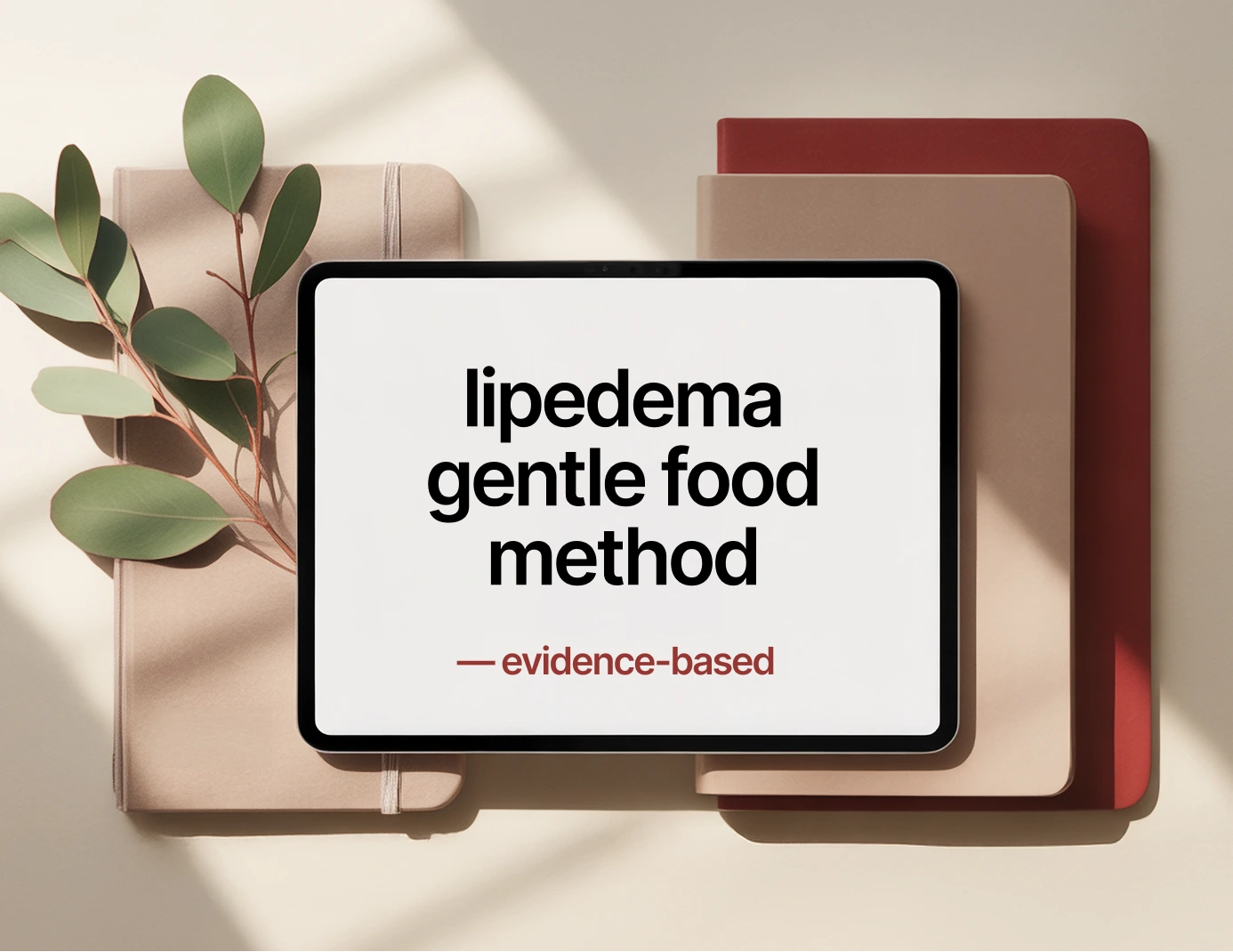
Lipedema Gentle
Food Method
One-time purchase: $57.00
Only available for a limited time.

14-Day Money Back Guarantee
I used to be the girl who always wore pants. Now I'M the one my lipedema friends ask for leg advice.
— Marta, 2 month into the method
Sound familiar?
You wear jeans in July to hide your legs
Your pants are loose on top, tight on legs
You angle away from mirrors everywhere you go
You keep worrying: "Will I end up in a wheelchair?"
You delete photos where your legs show
If yes, you’re in the right place🫂
If yes, you’re in the right place. 🫂
Solution analysis
Why most solutions fall short
Why most
solutions fall short
🥼 Surgery ($15K+)
Removes tissue but doesn't stop progression.
Requires nutritional change pre/post-op.
🦵 Compression/drainage
It is great, but it brings temporary relief. And requires ongoing expense.
🥒 Generic diets
Treat lipedema like regular fat (it's not). Often not effective or even worsens symptoms.
🧀 Keto
If you are familiar with research, it may seem like the only effective option. But it is actually only a 3d option on the shortlist.
recent science
Promising breakthrough
Recent studies (2022-2025) demonstrate the potential of nutrition in lipedema management.
Photos from the published
research studies.
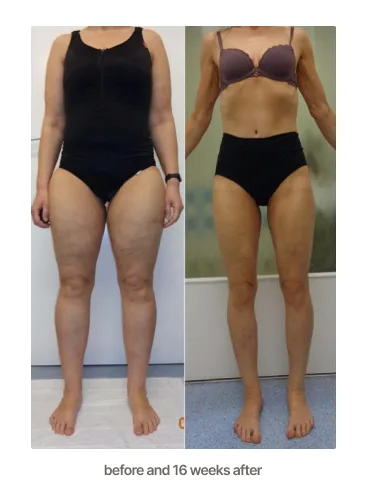
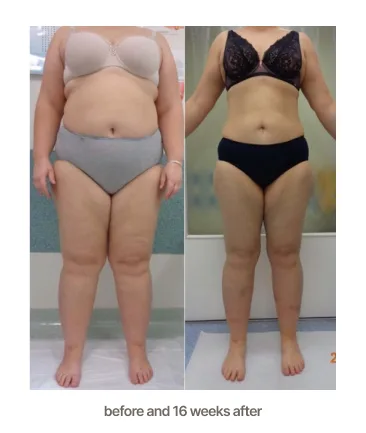
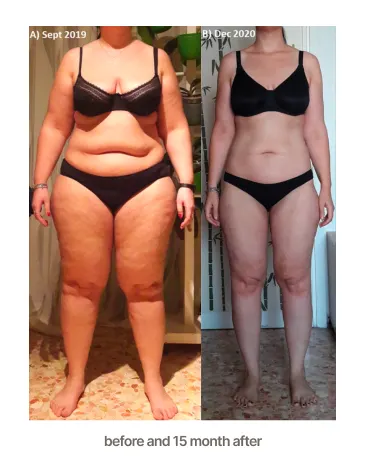
🔬 Photos from medical research
Clinically Validated Results.
Not Marketing.
No other treatments.
The nutrition only.
The exact method you'll learn inside.
👆These results are from published clinical studies.
There are at least 326 more documented cases.
Note: the images shown are from published clinical studies:
- Study participants following structured nutrition protocols
- Supervised by medical researchers
- Published in peer-reviewed journals
Used for educational purposes.
Individual results may vary.
Source photos 1 and 2: Jeziorek, Małgorzata et al. “The Effect of a Low-Carbohydrate, High-Fat Diet versus Moderate-Carbohydrate and Fat Diet on Body Composition in Patients with Lipedema.” Diabetes, metabolic syndrome and obesity: targets and therapy vol. 15 2545-2561. 22 Aug. 2022, doi:10.2147/DMSO.S377720
Source photos 3: Cannataro, Roberto et al. “Management of Lipedema with Ketogenic Diet: 22-Month Follow-Up.” Life (Basel, Switzerland) vol. 11,12 1402. 15 Dec. 2021, doi:10.3390/life11121402
This is your step-by-step guide to:
- Validate your lipedema suspicions
- Understand your body with lipedema
- Speak confidently with doctors
- Move forward with confidence
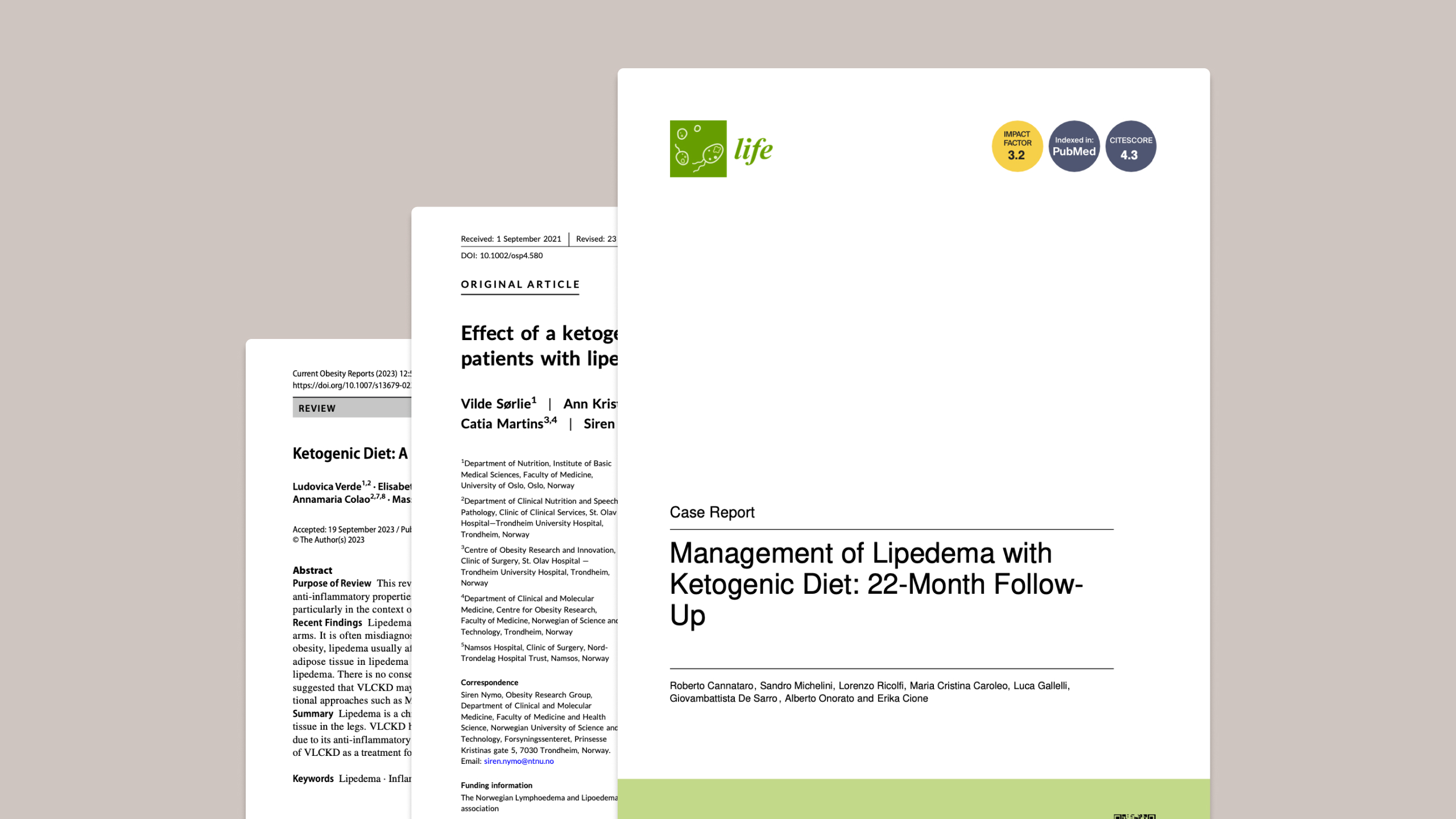
Studies confirm
LCHF eating helps:
Decrease lipedema tissue
Reduce inflammation and pain
Improve mobility
Regain confidence
👉 A copy of the medical publications and a summary are included.
INCLUDED
All information is based on the latest research about lipedema.
Including groundbreaking 2024 studies.

Scalise J. (2024). A Divergent Platelet Transcriptome in Patients with Lipedema and Lymphedema. Genes, 15(6):737.
Al-Ghadban S. (2024). The Expression of Adipogenic Marker Is Significantly Increased in Estrogen-Treated Lipedema Adipocytes Differentiated from Adipose Stem Cells In Vitro. Biomedicines.
Chachaj A, et al. (2023). Lymphoscintigraphic alterations in lower limbs in women with lipedema in comparison to women with overweight/obesity. Frontiers in Physiology.
Klietz M, et al. (2023). Understanding the Vicious Circle of Pain, Physical Activity, and Mental Health in Lipedema Patients. Journal of Clinical Medicine.
Dahlberg K. (2023). An uncertain uphill battle – experiences and consequences of living with lipedema. International Journal of Qualitative Studies on Health and Well-being. Supports claims about diagnostic challenges.
Poojari R, et al. (2022). Lipedema: Insights into Morphology, Pathophysiology, and Challenges. Biomedicines, 10(12):3081.
Klimentidis Y, et al. (2022). Genome-wide association study of a lipedema phenotype among women in the UK Biobank identifies multiple genetic risk factors. European Journal of Human Genetics.
Chakraborty R, et al. (2022). Indications of Peripheral Pain, Dermal Hypersensitivity, and Neurogenic Inflammation in Patients with Lipedema. International Journal of Molecular Sciences, 23(18):10313.
Herbst KL, et al. (2021). Survey Outcomes of Lipedema Reduction Surgery in the United States. Plastic and Reconstructive Surgery Global Open.
Czerwińska M, et al. (2023). The Usefulness of the Application of Compression Therapy among Lipedema Patients. International Journal of Environmental Research and Public Health, 20(2):914-928
Medical research papers included
Save time: show validated research to your healthcare provider
INCLUDED
⚠️
11% of women have lipedema,
but most don't know it.
Many doctors mistake it for simple weight gain
Average time to diagnosis: 10+ years
Symptoms often dismissed or misunderstood
Recent shows that food combinations trigger a 'tissue release signal' that conventional diets miss entirely.
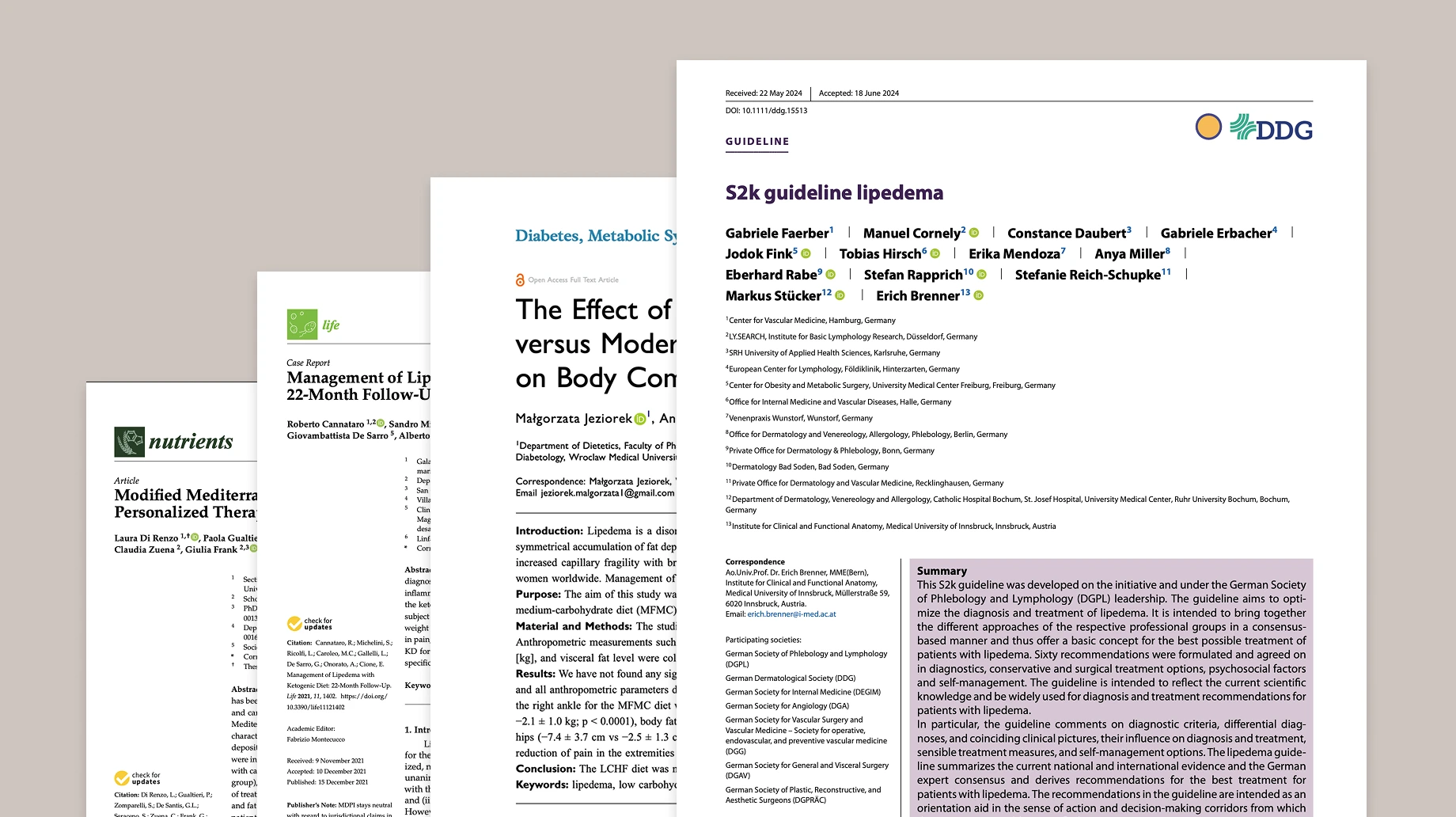
Overview and links to key research studies included
Results of the protocol in research:
87% had a measurable reduction in lipedema areas
3.1 inches (7 cm) average thigh reduction in 12 weeks
93% of participants reported decreased pain and tenderness
Benefits occurred regardless of overall weight loss
Note: This approach isn't available in conventional nutrition programs yet.
Individual results may vary.
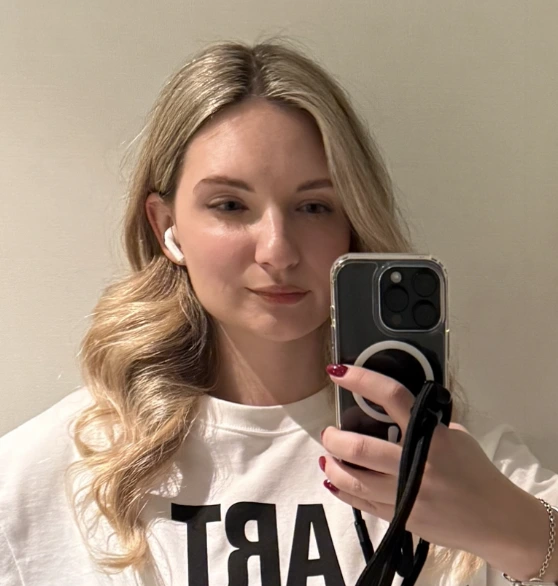
Hi, I am Marina and I have lipedema too
I am a woman with lipedema and a researcher by profession. I provide evidence-based education for women who understand lipedema as a lifelong condition and are seeking sustainable wellness approaches.
😫
The Old Way
Wait months to get a diagnosis
Spend thousands ineffectively
Face dismissal from doctors
Watch symptoms get worse
Feel alone and confused
😊
The New Way
Get clarity in 20 minutes
Know exactly what to tell your doctor
Start proper management early
Save thousands on wrong treatments
Join a community that understands
Customer Reviews
The REAL feedback
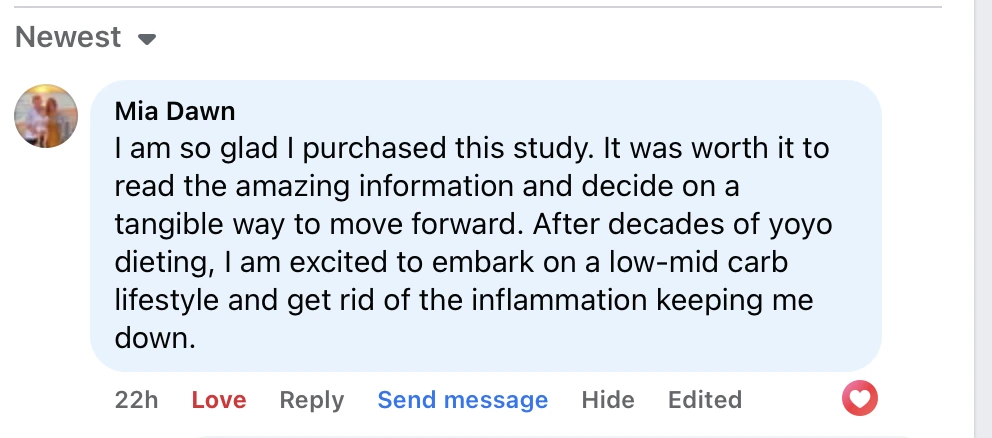
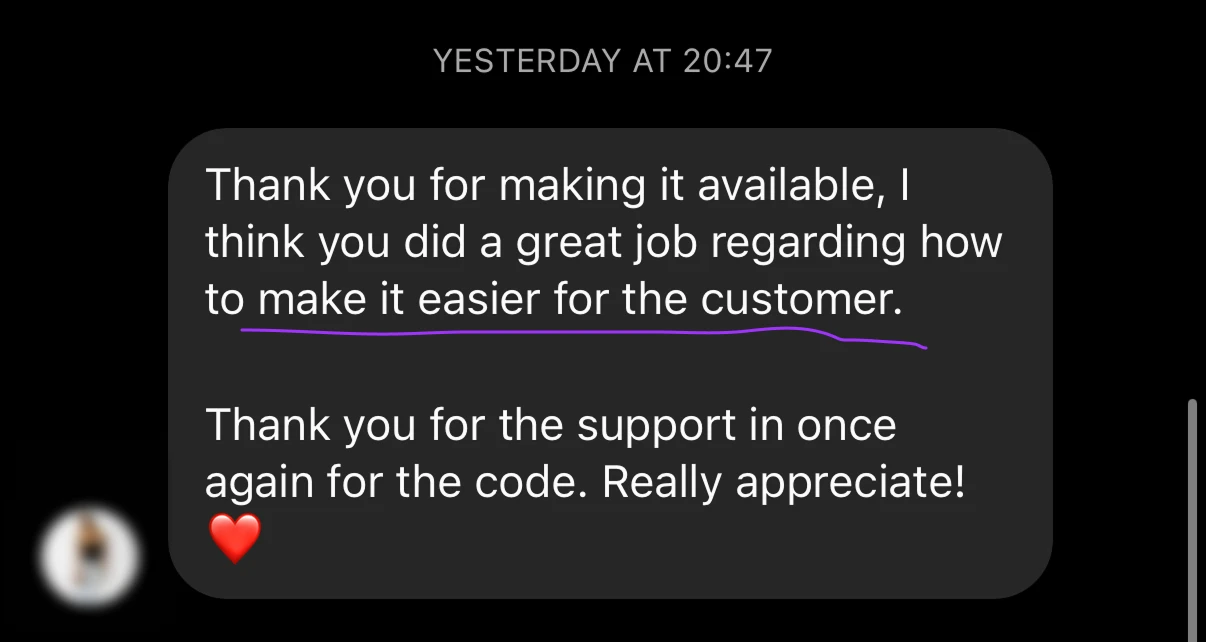
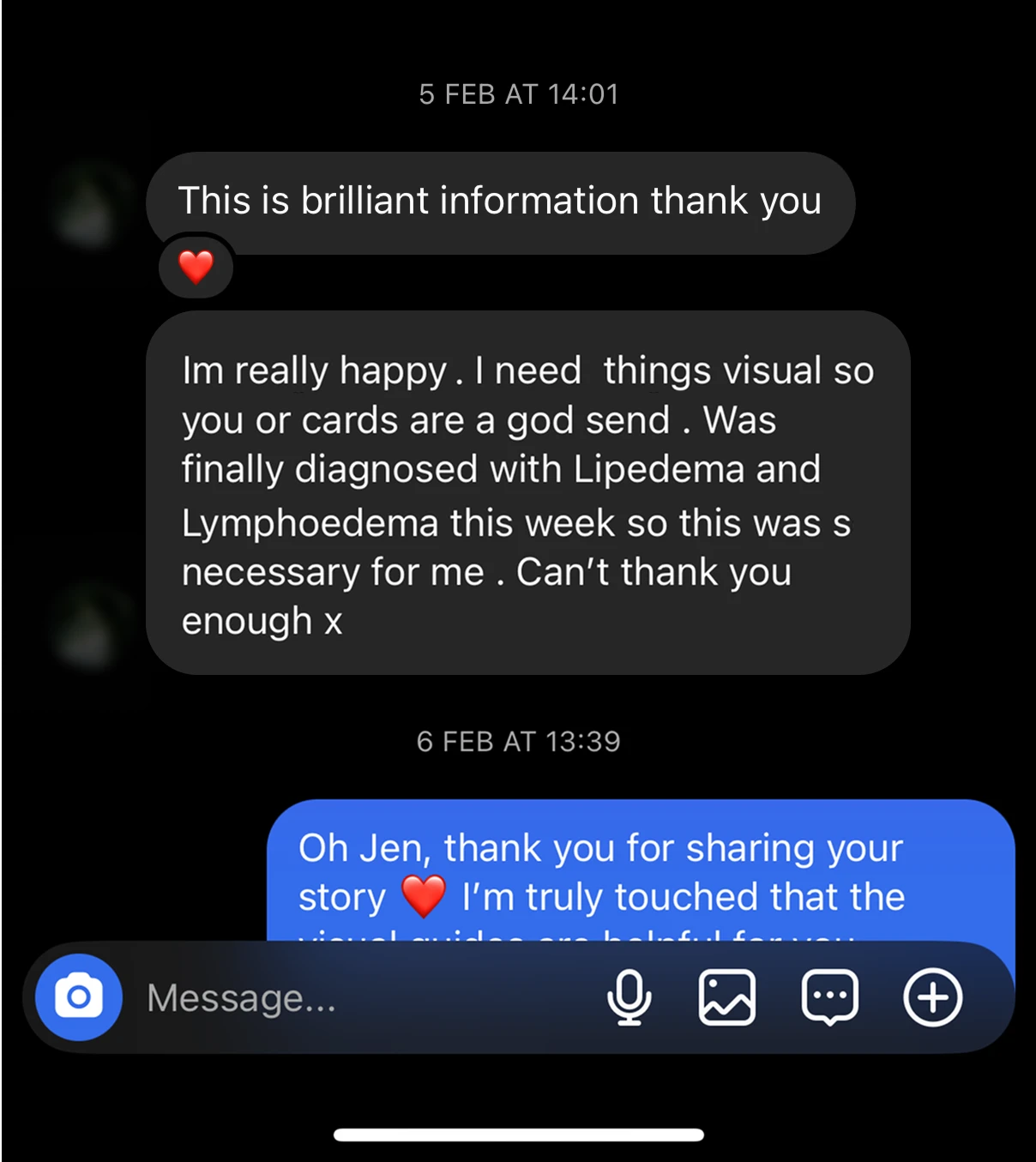
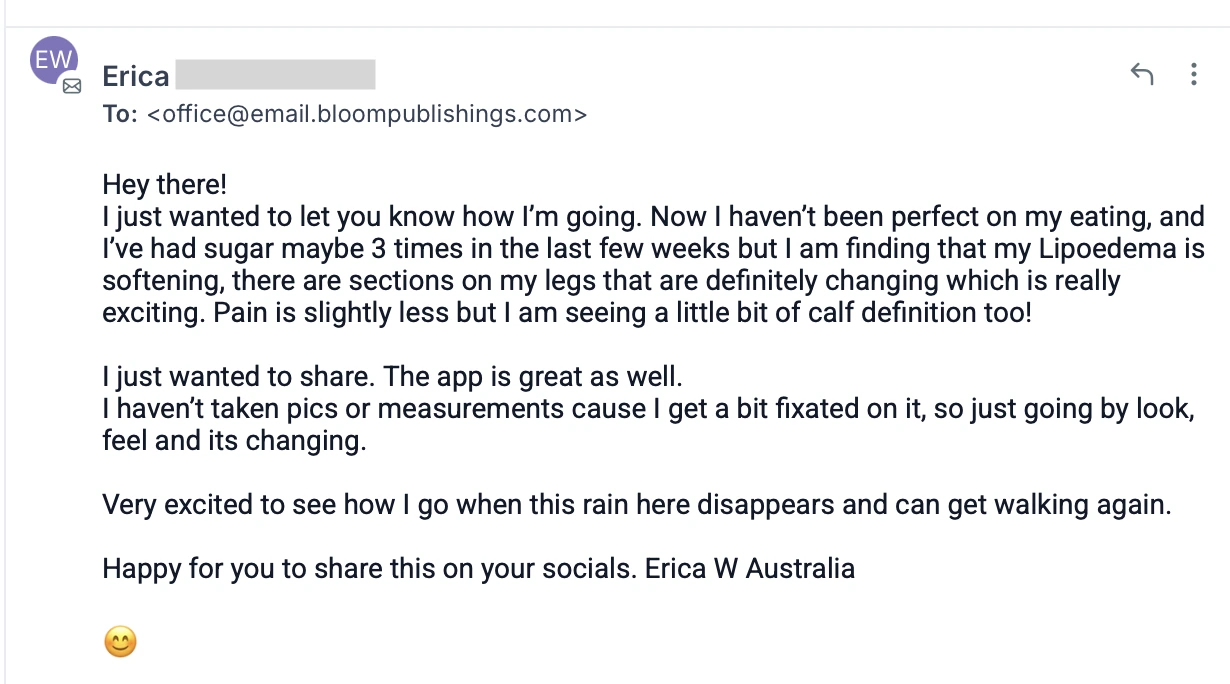
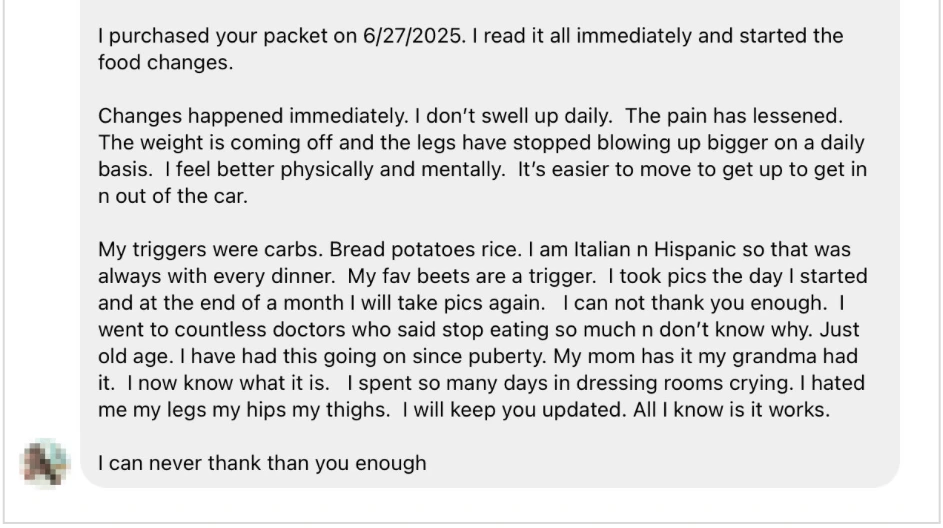


the challenge & the Mission
Protocol that finally works for lipedema
Has some important nuances.
Even leading lipedema specialists acknowledge a critical problem:
The dietary approach that studies suggest works best for lipedema is difficult to maintain in the long term due to its restrictive nature.

The Gentle Food Method addresses this by:
Discover which foods help your legs (and which ones hurt)
Creating visual tools that simplify daily choices
Simple changes that work with your real life
Focusing on long-term wellness approaches, not short-term perfectionism
This isn't another "21-day miracle diet", it's a sustainable
educational approach designed specifically for understanding research about lipedema wellness.
What's inside

Get slimmer, healthier lipedema legs.
The proven method that works for lipedema. Without giving up the foods you love.
12 bite-sized lessons
Proven Food Concept
Traffic Light Decision System
Simple Meal Building Formula
Research foundation
8+ Clinical Studies Breakdown
What Works vs What Doesn't Analysis
Specialist Concerns Addressed
Bonuses:
Visual Food Cards
Lipedema Answer Book
One-time payment: $57

Frequently
asked questions
How is this different from other diets I've tried?
This isn't another diet - it's a research-backed method designed specifically for lipedema tissue. Most approaches fail because they treat lipedema like regular fat, but research shows it responds differently.
What makes this different:
- Based on 8 published studies specifically testing lipedema nutrition
- Focuses on gentle, sustainable changes that work with your body
- Addresses the unique metabolic factors that make lipedema tissue resistant to traditional approaches
- Designed to help you feel confident in your food choices, not restricted
Unlike generic diets, this method targets what research shows actually influences lipedema tissue behavior.
What results can I expect, and how soon?
Based on research and participant feedback:
Many women report feeling more confident about food choices within 24-48 hours. Research participants experienced measurable improvements within 60-90 days when consistently applying the strategies.
What to expect:
- Days 1-7: Clear guidance on what helps vs. hurts your legs
- Weeks 2-8: Implementing changes that fit your lifestyle
- Month 2-3: Consistent results from research-backed strategies
Remember: This provides education about research findings. Individual results vary significantly based on consistency, starting point, and individual factors. Always consult your healthcare provider.
Will this work for my stage of lipedema?
Yes, this works for all stages (0-4). In fact, research shows 93% of participants reported decreased pain regardless of their starting stage.
Here's why timing matters: Lipedema is progressive. The sooner you start applying these research-backed strategies, the better your results and the more you can influence your lipedema's path forward.
Whether you're trying to prevent progression or manage current symptoms, you'll learn exactly which foods help vs. hurt your specific situation.
Important: This provides education about research findings. Individual experiences vary. Always consult your healthcare provider about your specific stage and needs.
What are autor's qualifications?
Marina combines a psychology degree, health coaching certification, and personal lipedema experience. She's analyzed every major lipedema nutrition study published and translates complex research into practical guidance as someone living with the condition herself.
Her approach: research-informed education, not medical treatment.
I'm really busy. Will I have time to follow this?
Yes! Designed for real life:
- Visual food cards for instant decisions
- 10-15 minute learning modules
- Principles, not rigid meal plans
- One new concept per week
- Mobile-friendly format
The gentle approach means no drastic overnight changes - just sustainable shifts that fit your schedule.
What if it's not what I expected?
14-day money-back guarantee. If you're not completely satisfied, email us for a full refund. This removes all risk from your decision.
Manage lipedema with food, while keeping the foods you love.
14-Day Money Back Guarantee
IMPORTANT DISCLAIMER
This program provides educational content about nutrition and lipedema research. It is not medical advice, diagnosis, or treatment. Individual results may vary significantly. Always consult qualified healthcare professionals before making changes to your diet or treatment plan.
